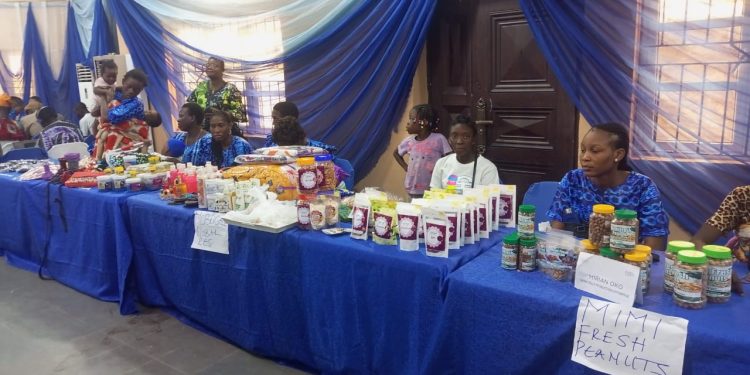Persons with visual impairment encounter discrimination in society and are oftentimes considered unfit for business opportunities and substantial empowerment program. To change the narrative and spotlight the capability of blind women, the Women Wing of the Lagos State Chapter of the Nigeria Association of the Blind (NAB) held an exhibition in Lagos recently.
Themed: ‘Empowering Women, Celebrating Diversity, Entrepreneurship and Creativity’, the exhibition was an opportunity for the Blind women to penetrate the market.
Bukola Ogunsanya, the NAB Women Leader explained some of the challenges that Blind women encounter with regard to their businesses, stressing that “people think our blindness affects our productivity, and they question our capability, which impact on the general acceptance of our products.”
Ogunsaya shared that “the idea behind the exhibition after discovering the gap between us and our customers and the need to show the world that we are creative and productive.
“It is the next sensible step to enable our women to gain access to markets that have, for too long, appeared impenetrable for vision-impaired entrepreneurs.”
Ogunsanya emphasised that “the exhibition comes on the heels of the successful NAB kitchen program, where select blind women were trained in the art of baking. We believed that this exhibition should follow suit, so the public is aware that we can be productive despite our blindness.”
While urging the general public to support them through patronage, Ogunsanya also stressed the critical need for government support, calling for tailored programs, mentorship opportunities, and visually impaired-friendly training initiatives.
Furthermore, the women leader underscored the vital role that both private organizations and government entities can play in fostering inclusivity and empowerment.
“They can help us be more productive by patronizing our businesses, offering contracts for our products and services, and supporting us in navigating bureaucratic hurdles such as business registration and regulatory compliance.
“Government authorities can also help with the provision of waivers for business registration fees and exemptions from levies such as local government taxes, NAFDAC, and SON registrations, to facilitate the growth and sustainability of visually impaired-owned businesses,” she added.
Barr Abolarinwa Salami, the Chairman of NAB Lagos harped on the need for members of the society to see the ability and productivity before focusing on the impairments that persons with disabilities have, so they can be seen as parts of the society.
Salami said “lift them out of poverty and the only way you can do that is by patronizing them not by giving them alms in one way or the other. So, let’s try and patronize the goods they sell, create a market for them because that’s our major challenge.”
He called on government and private establishments to provide a structure for patronage of products produced by persons with disabilities, adding that “the kind of structure that will permit PWDs to use government or private premises to sell their products. So, that they will not only get empowerment but at the end of the day those things they claim they are selling will still end up at the corners of their home and at the end of the day they will be the ones to consume or dash them out.”

Mrs. Adenike Oyetunde-Lawal, General Manager, Lagos State Office of Disability Affairs (LASODA) while commending the women shared that “there are women with disabilities in Lagos who no longer want to be receiving alms but rather to show that indeed they have the capacity, ability.”
She also urged corporate institutions and the general public to patronize them.
“I’m asking every single person to please remember that there are women that are blind in Lagos who can provide and produce liquid and detergent soap, fashion items, make up, pastries, chin-chin, plantain chips, fabric of different types, handbags, purses, just to mention a few and also patronize them and allow them to have their economic reality change as a whole.”
Mr. Wole Akingbola, one of the facilitators, while speaking on repackaging said, “It is necessary that blind women improve in their products’ packaging so that their products will be accepted within the society.”
Akingbola also advised that the women should leverage social media to promote their products,
Another speaker, Mrs. Olubanke Kobiti-Lambo, Propietress of El-Shadia School, commended the women and stressed that “if somebody without sight can sit down to learn and produce things like this, I believe, if they get support and encouragement, they will make more impact.”
One of the exhibitors, Mrs. Omoturayo Fasepe, a single mother of two, who produces perfume oil, and diffusers shared that “this program means a lot to me because I see it as an opportunity to prove myself as an entrepreneur with visual impairment. So, it’s not just an ordinary program, but an opportunity to put women with visual impairment who are entrepreneurs into the limelight.

